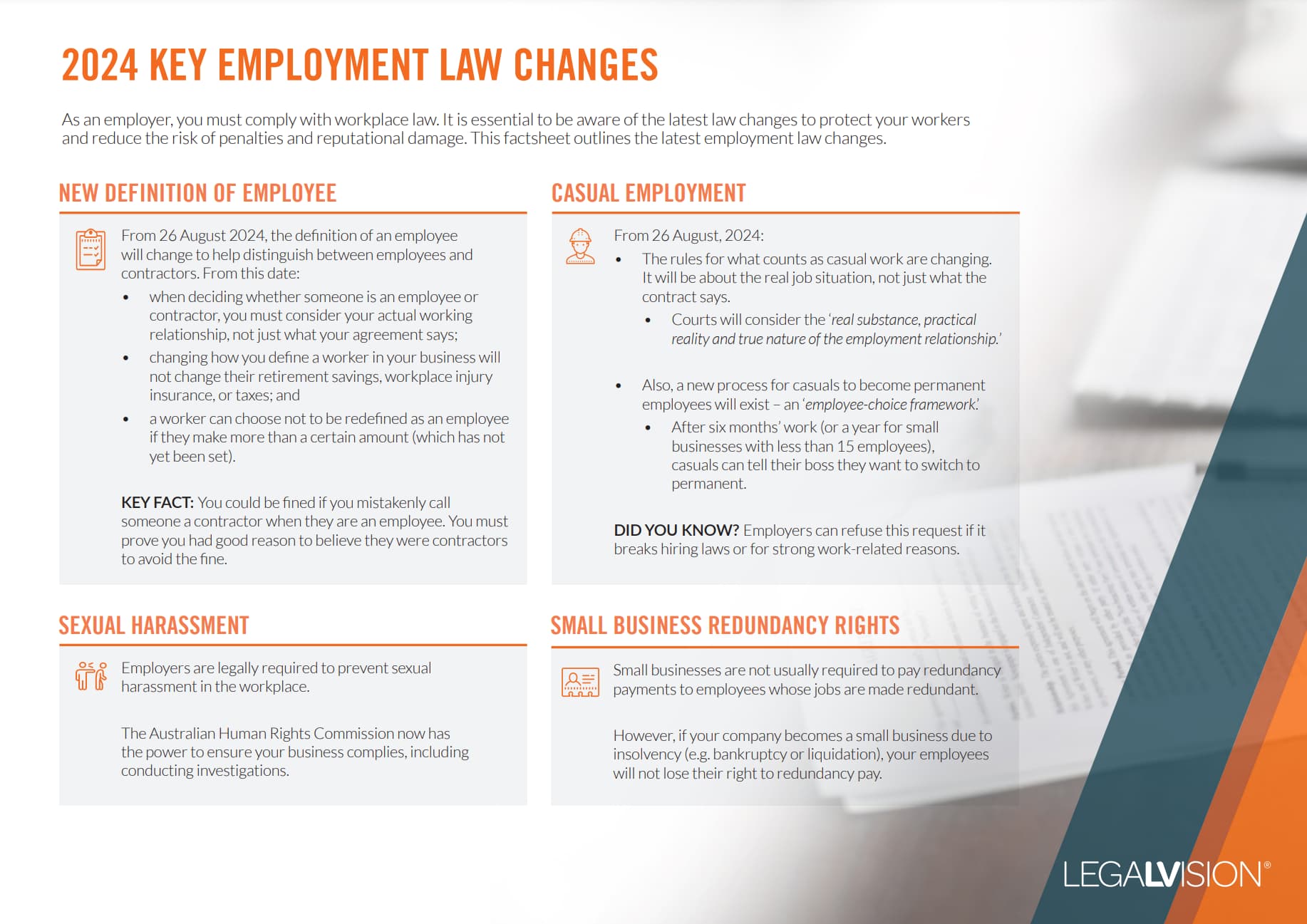In Short
- Employers now have a legal duty under the Respect@Work amendments to the Sex Discrimination Act to prevent sex discrimination and harassment.
- The positive duty requires proactive measures, including following AHRC guidelines, to identify risks and implement prevention strategies.
- Non-compliance can result in enforcement actions, legal penalties, and reputational damage.
Tips for Businesses
Review the Australian Human Rights Commission’s guidelines on complying with the positive duty under the Sex Discrimination Act. Take proactive steps like training leaders, fostering an inclusive culture, updating policies on acceptable behaviour, and setting up clear reporting procedures. Consult an employment lawyer to ensure your actions are reasonable and proportionate for your organisation.
As an employer, you have a legal duty to take all “reasonable and proportionate measures” to prevent unlawful sex discrimination as much as possible. This duty results from changes to the Sex Discrimination Act 1984 (SDA) made in December 2022, known as Respect@Work. This article will explain sex discrimination and what the law expects from you as an employer to stop it from happening.
Respect@Work
In 2020 the government conducted a formal inquiry that resulted in a landmark report called the Respect@Work Report. The Respect@Work Report revealed the alarming prevalence of sex discrimination and sex-based harassment in Australian workforces and called for legislative change to prioritise prevention by employers.
As a result of the Report, the Australian government made amendments to the SDA. These amendments, which incorporated a significant number of the Respect@Work changes, introduced a “positive duty” on employers or a person conducting a business or undertaking (PCBU) to eliminate, as far as possible:
- workplace sexual harassment;
- sex discrimination;
- sex-based harassment;
- conduct that amounts to subjecting a person to a hostile workplace environment on the grounds of sex; and
- certain acts of victimisation.
What is Sex Discrimination?
The SDA now requires employers and PCBUs to prevent workplace discrimination based on a person’s sex. This extends to preventing conduct by all workers in the business, including employees, contractors, volunteers, and visitors. It means that employers and PCBUs must do more than simply take a reactive approach when sex discrimination occurs.
Broadly, a person unlawfully discriminates against another person if they:
- treat them less favourably than others based on certain personal factors, like their sex (which is direct discrimination); or
- require the other person to comply with a workplace condition that is the same for everyone but is not reasonable due to their personal attributes or circumstances like their sex (which is indirect discrimination).

As an employer, it is essential to understand what employment laws have changed and their implications for your business — particularly the changes to the Fair Work Act 2009 through the new Closing the Loopholes legislation.
How Can I Ensure Compliance with the Positive Duty?
To properly prevent sex discrimination and meet your responsibilities under the SDA (as well as other laws like workplace health and safety laws and the Fair Work Act 2009), you should consider implementing control measures and taking a proactive, consultative approach. This will also help improve your workplace’s culture, safety, and inclusiveness.
What is ‘reasonable and proportionate’ prevention will vary depending on several factors like:
- the size, nature and circumstances of your business or organisation;
- your business’ resources (whether financial or otherwise); and the
- practicability and cost of steps to eliminate such conduct.
As a starting place, you should review the ‘Guidelines for Complying with the Positive Duty under the Sex Discrimination Act 1984 (Cth)’ (Guidelines) released by the Australian Human Rights Commission (AHRC) in 2023. The guidelines outline extensive control measures and steps that the AHRC would expect employers and PCBUs to implement. The proactive measures start at the executive level and trickle down to individual workers. There are seven standards identified by the AHRC relating to:
- Leadership;
- Culture;
- Knowledge;
- Risk Management;
- Support;
- Reporting and Response; and
- Monitoring, Evaluation and Transparency.
Reasonable and Proportionate Measures
Reasonable and proportionate measures may look like:
- organising and maintaining training for senior leaders in your business to ensure they model appropriate behaviours and are up to date with developments in the law;
- fostering a safe, respectful and inclusive culture by proactively addressing cultural issues and encouraging diversity and equal opportunity;
- implementing policies and procedures that address acceptable and unacceptable behaviour; and
- ensuring proportionate and consistent consequences exist for perpetrators of sex discrimination.
Enforcement and Non-Compliance
You should be aware that the AHRC has been conferred new regulatory powers to investigate and enforce compliance with the positive duty (which commenced in December 2023). The AHRC has the power to make recommendations, issue compliance notices, enter into enforceable undertakings with businesses to seek compliance and refer matters to the Federal Courts for direct compliance.
Individuals who have been subject to sex discrimination can also apply to the Federal Court for an order of compensation. Beyond these risks, there will also likely be reputational and cultural risks for your business for non-compliance.
Key Takeaways
As an employer, you have a new duty to proactively identify risks and take steps to prevent and eliminate sex discrimination in your workplace.
If you need help understanding your new positive duty, our experienced employment lawyers can assist as part of our LegalVision membership. For a low monthly fee, you will have unlimited access to lawyers to answer your questions and draft and review your documents. Call us today on 1300 544 755 or visit our membership page.
Frequently Asked Questions
Reasonable and proportionate measures depend on your business’ size, resources, and nature. You should consider providing regular training on acceptable workplace behaviour, setting up clear policies on discrimination and harassment, and promoting a safe and inclusive workplace culture. It’s important to review and update these measures regularly.
If you fail to comply, the AHRC can investigate your business, issue compliance notices, and even refer the matter to the Federal Court. Non-compliance could lead to legal action, claims for compensation from affected employees, and significant damage to your business’s reputation.
We appreciate your feedback – your submission has been successfully received.












